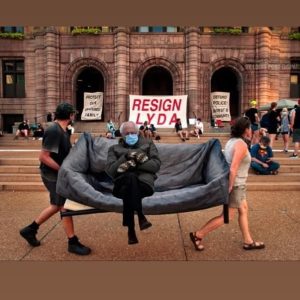It was in the context of the Catholic Worker that I began to learn of the many motivations of those who refuse to pay for war. Lana Jacobs who I lived with in the community in Columbia, Missouri explained to me and others quite simply that we paid our personal property taxes as one measure to pool our resources to provide services of value as part of our ethical belief. On the other side was the communal belief that we had an obligation to refuse to pay federal income taxes, half of which has gone to war annually for decades.
Sharing resources within the community made it possible for me invest time in energy into projects that provided for people’s basic needs and resisting militarism opposed to earning a large income. It was living and sharing lives with men who had been maimed by war that solidfied the decision to not pay for war. Those early experiences in community helped form my conscience in regards to taxes. It was many years into WTR before hearing people (mostly in NWTRCC) bring up local and state taxes and concerns of the policies that they fund.
I found myself at city hall once again during the last week of the year to pay my personal property taxes. In the state of Missouri, property taxes are due by the end of the year and so many wait till that last minute to get their taxes in (sound familiar?) In recent years I have committed to avoiding the headache of fighting the lines at city hall and have been mailing them in early.

Meme from Instagram portraying the author helping occupy St Louis City Hall
While I don’t necessarily believe the statement ‘you can’t fight city hall;’ it is not normally where I go to battle there seem to be at least annual protests there calling for change. A few years ago I shared a blog about a protest a few winters ago when the polar vortex was coming and the lack of resources was threatening people’s lives. Some time later there was a prolonged occupation of city hall to get the mayor to resign primarily because of her treatment of the unhoused population in St. Louis. Unfortunately with the new mayor there has been increasing needs for housing, less services available despite increased resources with the pandemic relief money.
In the days before the tax deadline, I realized I had not received my personal property tax bill. I was hoping against hope that I would not have to go in person but when I called city hall and heard the recording “Due to the current pandemic our operations have been affected and we are doing everything we can to assist you and appreciate your patience” I knew there were be no answers in the bureaucratic black hole of the phone maze; when I searched online it said that my account was closed.
So off I was to city hall on the penultimate day to pay my taxes. The line seemed short until we rounded a corner to a strange game of musical chairs that eventually ended at office cubicles that resulted in a tax bill only to go to two other lines before paying the bill. I kept thinking of one of my favorite lines from the film, Harold and Maude, “It’s the curse of a government job.’

Image from Shutterstock
Fortunately I was surrounded by good company and we were laughing making light and parting with well wishes, On my way out I asked a worker what had happened; it seems like city hall failed to send out the property bill and closed the accounts of many residents. Again I was thinking about all the misallocation of our collective resources and the need for transparency in how our taxes are being spent. (I found one or two sources of how my local taxes are being spent a little upsetting.)
I was thinking a lot about Ruth Benn writing about her many encounters in recent times with the IRS especially in Problems Were Encountered. I imagine there will continue to tensions with the tax collectors as they try to demand payment and we demand accountability for how are collective resources are spent.
As 2022 has come to a close I am thinking about people who have passed this past year who influenced my war tax refusal and pacifism including Robert Randall, Carl Kabat and Lana Jacobs. As we enter into 2023, I am thinking about how to build community and facilitate discussion around these issues. I am wondering your thoughts on the matter.
Post by Chrissy Kirchhoefer
Update: The last blog post was calling for a Christmas truce for the war with Ukraine and Russia. Russia announced a 36 hour truce over the Orthodox Christmas Holiday.





My thoughts are that this blog post seems somewhat wandering and lost. You end by remarking on the deaths of several people who inspired you to do war tax resistance. I knew Carl Kabat from the Plowshares 8, only met Lana and Steve via friends from the Des Moines Catholic Worker in 1981 or so. I had started refusing to pay Federal income taxes before I met these people, when I started work, so was not inspired by them, but I imagine your mention of their names indicates you may be reassessing your tax resistance as a result of their deaths.
At the last Tax Day protest I attended, 2017, in San Francisco, I noticed that over half of those present were people I had known from Northern California War Tax Resistance in the late 1980s. This is not hyperbole: I recently looked at a photo of this SF demonstration, and literally over half the group had been active 30 years before. That’s not a good indication this “movement” is growing. I notice NWRTCC Twitter posts go completely unreplied to, including a post asking that readers tweet their questions. This, to me, is a pretty good comment on war tax resistance in the US.
Michael, I think the current state of war tax resistance (WTR) is more complex than your comments, though I still struggle with what the future of the war tax resistance movement and local groups will look like. Before the advent of the internet, most individuals interested in war tax resistance had to contact a local war tax resistance group to find out more information… and some of those folks might then participate in tax day actions.
Now that anyone can become well-versed in WTR by perusing the resources that are freely available on our website, local groups have much less interaction with folks wanting to learn about war tax resistance. In any given year, we have about 40,000 unique visitors to the NWTRCC website, who look at an average of nine pages on the website. These numbers, which I believe indicate serious interest, have remained steady.
Local groups have also played a role in supporting each other during periods of collection from the IRS. During the 1980s and early 1990s, it was also common have cars and houses seized by the IRS. Collection efforts dropped significantly after 2010 with the gutting of the IRS budget and property seizures dwindled to practically nothing after a change in IRS philosophy in the late-1990s. So another major role that local WTR groups provided also became less necessary.
With the $80 billion in additional funding that the IRS will receive over the next ten years, we will likely see an increase in collections. These collection efforts may have the unintended consequence of leading isolated war tax resisters to reach out to local groups or form local groups. Most of the calls I receive in the NWTRCC office are from long-time war tax resisters who have never been in contact with other war tax resisters. They call the office because of an action by the IRS that leads them to reach out for support.
Michael, Thanks for sharing your thoughts. One of the more enlivening suggestions I heard at a NWTRCC conference was the suggestion to reevaluate our war tax resistance from year to year. As taxpayers in the U.S., we know that the greatest percentage of our income taxes go towards war and war preparations; we have the greatest leverage to resist these income taxes that lead to carnage. I think it would behoove all of us to examine the various actions we take in making the world better. A great thing to do in this new year!